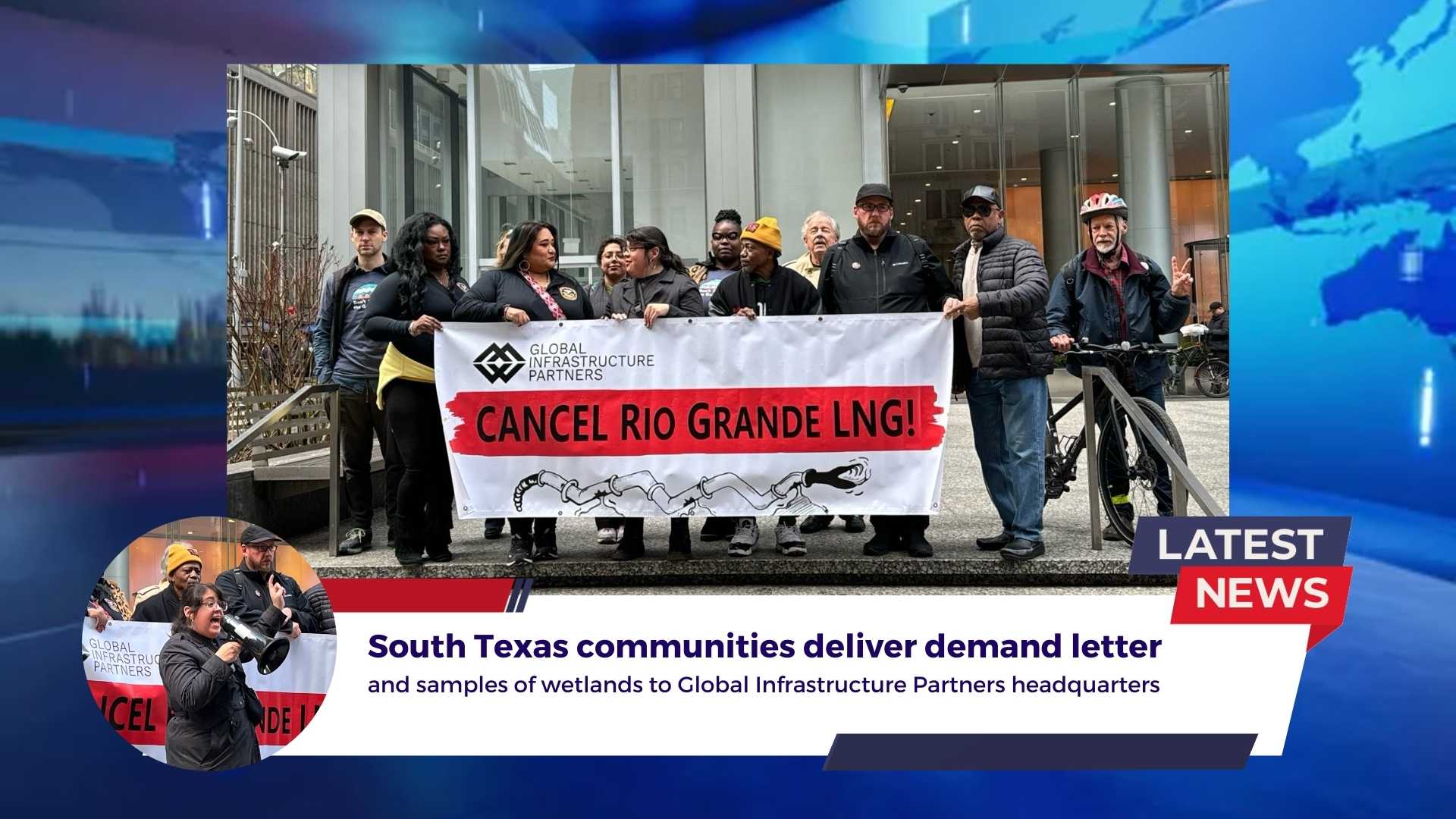
In the news: PESP, Texas community demand GIP stop Rio Grande LNG
March 8, 2024
Last month, community members from South Texas joined together with PESP and other activists and watchdog groups at the headquarters of private equity firm Global Infrastructure Partners (GIP) to demand an end to GIP’s proposed liquid natural gas project, Rio Grande LNG. The groups delivered a letter signed by over 90 organizations to GIP headquarters urging the firm to end development of the terminal. The groups also provides wetland samples from Brownsville, Texas, the site where bulldozing for the terminal has already begun.
Global Infrastructure Partners has a substantial $3.5 billion investment in Rio Grande LNG, making the firm the largest investor with a minimum 46% ownership stake in the project. Because of the opaque nature of its business model, private equity firms like GIP can escape public scrutiny while continuing to drive fossil fuel expansion. Brownsville residents and members of the Carrizo Comecrudo Tribe of Texas will be the first to bear the brunt of the facilities’ environmental hazards, all while leaked methane accelerates global temperature rise.
The action at GIP headquarters culminated after months of campaigning and speaking to GIP’s largest investors. PESP joined community and Tribe members at Washington State Investment Board and Oregon Investment Council meetings to request their support in halting the Rio Grande terminal given the environmental and financial risks. Community members and PESP sought to meet directly with GIP leadership to address concerns around the Rio Grande investment, but the firm was unresponsive.
Texas Public Radio February 27, 2024: Climate activists deliver demands, wetland samples to Rio Grande LNG funder in New York City
“The fight against the Rio Grande LNG liquified natural gas project outside of Port Isabel and Brownsville was taken to New York City this week.
South Texas climate activists, including Christa Mancias of the Carrizo Comecrudo Tribe of Texas and Bekah Hinojosa of the South Texas Environmental Justice network, hand delivered a letter to the Global Infrastructure Partners (GIP) headquarters with more than 90 signatures from climate advocacy organizations on Tuesday. The letter asked the company to withdraw from Rio Grande LNG.
Going to the GIP’s office in person came from the groups trying to meet with company leadership for months to no avail.
‘Now, all we can do is show up at their doorstep with our demands and show the firm the real impacts of its investment,’ Abhilasha Bhola, senior campaign coordinator with the (PESP), said in a statement. ‘South Texas does not want to be bulldozed by private equity firms in order to build a costly and dangerous LNG terminal.’
In January, the same groups confronted the Oregon Investment Council about the state’s treasury investing $350 million into a GIP fund that funnels money into the Rio Grande LNG project. This followed the groups going to Washington state in November 2023 to tell the Washington State Investment Board (WSIB) to divest from the $400 million it invested into the same GIP fund for Rio Grande LNG.”
gasworld February 27, 2024: South Texas communities rally to stop $3.5bn Rio Grande LNG
“Community members from South Texas are set to gather with activists and watchdog groups to demand an end to Global Infrastructure Partners’ (GIP) Rio Grande LNG project.
It is thought that the group will today (27th February) deliver a letter signed by over 90 organisations to GIP’s headquarters laying out their wishes to terminate the project.
As well as the letter, it is believed that the group will also provide wetland samples from Brownsville, Texas, where bulldozing for the terminal has already commenced.
Abhilasha Bhola, Senior Campaign Coordinator for PESP, said that the group has been trying to meet with GIP leadership for months and hasn’t had any response.
She continued, ‘Now, all we can do is show up at their doorstep with our demands and show the firm the real impacts of its investment. South Texas does not want to be bulldozed by private equity firms to build a costly and dangerous LNG terminal.’
A huge concern is related to the environmental impact of the LNG site. According to the protestors, the Rio Grande LNG terminal is estimated to emit the equivalent emissions of 44 coal power plants every year, or around 163 million tonnes of carbon dioxide equivalent.
They also note that the terminal would be built on the land of the Carrizo Comecrudo Tribe of Texas, yet Rio Grande LNG, regulatory agencies, and banks have all failed to consult with the tribe on local impacts.
Additionally, the group notes that the facilities would significantly degrade local fishing, shrimping, and natural tourism industries, putting communities’ livelihoods at risk.
Global Infrastructure Partners has a substantial $3.5bn investment in Rio Grande LNG, making the firm the largest investor with a minimum 46% ownership stake in the project.”
Canary Media February 28, 2024: Inside the fight to stop LNG export projects in South Texas
“Now, LNG opponents are working to block the two other export terminals slated for the area as well as the gas pipelines that will feed them, hoping to stop the construction trucks in their tracks before the projects advance further. Most recently, on February 27, members of the Carrizo/Comecrudo Tribe and environmental groups visited New York City to protest outside the headquarters of Global Infrastructure Partners, the largest investor in Rio Grande LNG. Activists brought wetland samples from the Texas construction site and a letter demanding that the private equity firm withdraw its support for the project.
‘Our communities don’t want to be sacrificed,’ Hinojosa tells me. ’We don’t want these projects here or anywhere else.'”
